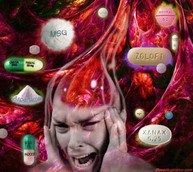
Research has long established that one of the best treatment modalities for many mental illnesses is the combination of the right medication in conjunction with talk therapy. Unlike medical illnesses which usually have an obvious organic or biological malady, mental illness is often intertwined with our feelings and emotions - the most subjective, varying and complicated pieces of our being. A diseased heart requires an angiogram, stints or bypass surgery. End of story. A "broken" heart is another matter entirely. Feelings and emotions remain one of the least understood and mysterious aspects of what it means to be a human being. And, when things go wrong emotionally, there is a litany of possibilities as to the cause, and another litany of available remedies. What works in the long run is therapy. What can work in the short run is medication. Our fast-paced society built on instant gratification will almost always reach for "the pill". Anything to make it go away NOW. Insurance companies oblige a quick, seemingly inexpensive, "generic" fix. We are one of the most medicated societies on Earth. These same insurance companies will often balk at long-term, more expensive psychotherapy.
While medication may alleviate severe symptoms quickly and allow a person suffering to feel better and perhaps become a more functioning individual, a pill can not get at the root of much of our suffering. For many, emotional wounds go deep and travel a long path back into our history. Talk therapy is designed in part to travel that path once more, cleaning and reorganizing as we go. Unlike swallowing a pill, this journey can be time-consuming and itself an emotional roller-coaster. Sometimes, we even feel worse before we feel better. But, the decision to enter into therapy can be a life-changing moment in which we declare a desire to not only feel better, but to get better. Getting better involves a lot of work, introspection and emotional healing that medications alone can not always provide.
Medications have their place and have saved countless lives and have improved the lives of millions more. In our rush to feel better and to treat every emotion and feeling out of the ordinary, let's remember that our mental health is in many cases more complicated, more unknown and more tenuous than even our physical health. Therapists are trained to help clients heal "broken" hearts just as physicians are trained to heal diseased ones. Recovering from heart surgery is going to be a lengthy, "two-steps ahead, one-step back" approach. Let's give ourselves the same permission and time-frame to heal our emotional wounds. And, healing our emotional wounds often involves talking about and processing those pesky emotions which define our species and make us each who we are.
Be kind to each other and to yourself.
© Copyright 2014 Douglas Layer, M.A., LPCC
While medication may alleviate severe symptoms quickly and allow a person suffering to feel better and perhaps become a more functioning individual, a pill can not get at the root of much of our suffering. For many, emotional wounds go deep and travel a long path back into our history. Talk therapy is designed in part to travel that path once more, cleaning and reorganizing as we go. Unlike swallowing a pill, this journey can be time-consuming and itself an emotional roller-coaster. Sometimes, we even feel worse before we feel better. But, the decision to enter into therapy can be a life-changing moment in which we declare a desire to not only feel better, but to get better. Getting better involves a lot of work, introspection and emotional healing that medications alone can not always provide.
Medications have their place and have saved countless lives and have improved the lives of millions more. In our rush to feel better and to treat every emotion and feeling out of the ordinary, let's remember that our mental health is in many cases more complicated, more unknown and more tenuous than even our physical health. Therapists are trained to help clients heal "broken" hearts just as physicians are trained to heal diseased ones. Recovering from heart surgery is going to be a lengthy, "two-steps ahead, one-step back" approach. Let's give ourselves the same permission and time-frame to heal our emotional wounds. And, healing our emotional wounds often involves talking about and processing those pesky emotions which define our species and make us each who we are.
Be kind to each other and to yourself.
© Copyright 2014 Douglas Layer, M.A., LPCC
 RSS Feed
RSS Feed